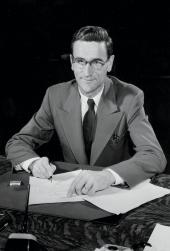
W.B. (Bill) Baker was born at Verigin, Saskatchewan in 1919 and was raised on his parents' farm. He graduated from the University of Saskatchewan School of Agriculture in 1940 and from the College of Agriculture (with Distinction) in 1944. His primary fields of study included sociology, rural sociology, and social psychology. His broad interest was adult education, with a special interest in group process. He was the director of the School of Agriculture and professor of rural education, University of Saskatchewan, from 1946 to 1956. In this role he pioneered a number of adult education methods in campus instruction. From 1952 to 1956, he was director of the Royal Commission on Agriculture and Rural Life; this was the first commission to implement broad public participation in its data collection process, resulting in fourteen benchmark reports. Following the Commission, he was named director of a newly formed Centre for Community Studies, a position he held from 1957 to 1964. From 1966 until his death in 1969 he was president of the Canadian Centre for Community Studies, located in Ottawa.
During his career, Baker worked on a variety of rural and community development projects, as well as on issues related to adult education, including agriculture, co-operative research, the rural church, and aging and long-term illness. He believed that if adults had access to information they would make wise decisions, and strove to improve the methods and processes used to involve the public in decision making. Baker's sociological and adult education contributions extended into numerous international arenas, including the United States, Australia, India, Venezuela, and the United Nations. His many honours included a Doctor of Laws degree from North Dakota State University in 1964.
Harold R. Baker